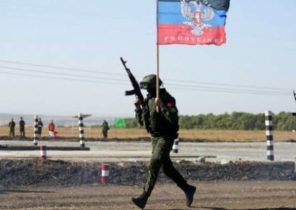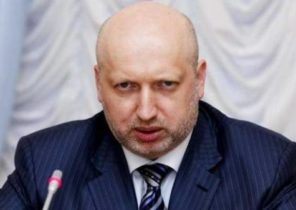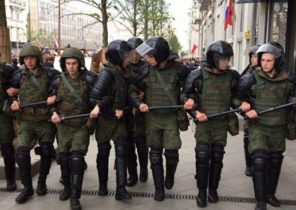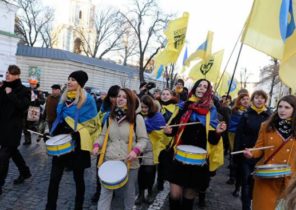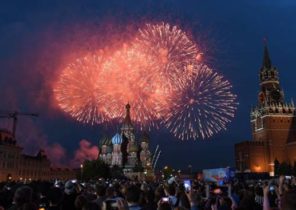While the whole world is engulfed in a pandemic coronavirus, we have coming the next global crisis. A few weeks ago in Siberia for the first time in the history of meteorological observations was recorded temperature of 38 degrees Celsius.
Rapid warming is causing the melting of the permafrost soil, the destruction of infrastructure and may even cause a oil spill. Despite the apocalyptic weather in Siberia, the Russian government sees climate change as largely good. The government has already announced its plans to use the positive aspects of climate change, primarily in the agricultural sector. These so-called positive aspects are one-sided, because they potentially allow Russia to gain another weapon to conduct its hybrid war. And this weapon — wheat.
Russia is one of the very few countries that are likely to be able to expand the area of its arable land — in such before the grain-producing regions, such as Siberia, — in a variety of climate change scenarios. According to forecasts of scientists, Russia can expand the area of arable land suitable for wheat cultivation, at 4.3 million square kilometers. Although wheat is only 2.3% of the total export of Russian wheat has an important place on the global market for wheat exports. Russia is the world’s largest exporter of wheat, and according to projections, by 2028 it will control 20% of world grain exports. Most likely, climate change will further strengthen Russia’s position in the global grain market.
Meanwhile the fact that Russia controls a large segment of the global grain markets should not be considered the guarantor of stability of food supplies. Although climate change could expand the area of arable land in Russia, there is also often extreme weather occurs. The melting of permafrost increases the risk of forest fires in Russia and droughts are likely to happen more often and become stronger. Climate change will affect food security in Russia, however, due to the fact that the role of Russia as a global grain supplier continues to grow, the global impact will be felt more acutely.
Due to climate change the dependence of other countries on Russian grain will increase, which in turn will make them more vulnerable in the event if Russia will be extreme weather events or if it decide to restrict grain exports. As climate warming game of Russian roulette with the supply of grain will become for other countries more dangerous.
Pandemic coronavirus demonstrated how risky to rely on Russia in terms of grain imports. Despite warnings from the world health organization and the world trade organization, Russia has imposed a quota on the export of such major cereals as wheat, barley and corn, in a time when a virus has spread around the world. This decision of Russia has pressured other countries to hastily look for ways to replenish stocks of grain, which was an additional burden for governments who find themselves in difficult situation due to the pandemic. The introduction of this quota has had a major impact on the main importers of Russian wheat are Turkey, Egypt and Bangladesh, which are strategically important and simultaneously fragile States in their regions. Fortunately, the validity of this quota expired in July, and decided not to renew.
This is not the first case when Russia restricted the export of food products, and the results of such restrictions may be destabilizing. In 2010, Russia restricted grain exports due to drought happened. This has led to higher prices worldwide, and, according to some analysts, this was one of the causes of the Arab spring uprisings. For obvious reasons of food security in Russia is the Russian government’s priority. However, even if food security in Russia not threatened, the Kremlin reacted to the crises by introducing export restrictions. At the disposal of Russia was a very significant stocks of grain in that moment, when in 2010 she decided to enter the export quota. Today the situation is similar.
Even more disturbing than the restriction of Russian exports in times of crisis, raises the possibility of restricting Russian exports with the aim of exerting political pressure. Russia can transform the export of wheat in a weapon to exert pressure on those countries that lack of food caused by warming, leaves few alternatives. Russia demonstrated their skills of conducting a hybrid war and has repeatedly used other resources, such as fossil fuels as a weapon. Given the master the ability to use Russia’s resources, its role in global wheat markets is alarming. No matter what goals Russia — does it protect their food security or is a hybrid war, her conduct in 2010 and now, during a pandemic coronavirus, is a harbinger of new risks in a changing climate.
The need to confront the threat of climate change is of particular relevance now, when Russia is based on the threat, and politicians were at a crossroads. The first option is to return to a normal life, without reducing the amounts of greenhouse gas emissions into the atmosphere. But even this “normal” life will increasingly violate the various manifestations of climate warming, such as desertification, hurricanes, severe drought, or even the next pandemic caused by melting permafrost. All these disasters will have a cascading impact on food security. In an increasingly unstable world, Russia is likely to be increasingly faced with situations in which she will feel in danger and restrict the export of grain.
The second option of action in the face of climate change is to focus on those vulnerabilities that demonstrated the pandemic. Instead of returning to normal life after the end of the pandemic, the government can stimulate the economy, accelerating the transition to cleaner sources of energy. Policy can take a proactive stance in addressing food security. The country can perform the sources of their imports, in order to assess the ability to adapt to climate change and geopolitical goals of exporting countries and to make appropriate changes to the list of their suppliers. The pandemic has also helped to identify the problem of food waste. Introducing new methods of redistribution of food, the country can reduce its dependence on imports.
Now is the time for governments to increase their involvement in international institutions. Strengthening international coordination will help us to cope with the pandemic, and also to solve the climate crisis and related food insecurity. The countries of Latin America and the Caribbean already have coordinated efforts to support the supply chain during a pandemic. This model can be expanded with a mandate of an international organization, the task of creating grain reserves. If any international organization will be able to create and dispose of stocks of grain, she will be able to assist countries that fall into the difficult situation the next time Russia decides to restrict its exports — due to the pandemic, climate change or geopolitical reasons.
In any crisis hidden new possibilities. The question is, who will seize these opportunities — either Russia or the allies. The global recession caused by a pandemic coronavirus, is a harbinger of the climate crisis. The next decade is our last chance to achieve the goals spelled out in the Paris climate agreement.
Global leaders must turn this public health crisis and economic crisis into an opportunity to seriously address the problem of climate change. We need to reduce risks, adapt and take on the responsibility of preparing for warming, which has already begun. Adaptation and sustainability require an innovative and proactive approach to food safety. Russia has already shown that it will not be a reliable source of supply of grain next time she will be faced with a pandemic or weather disasters. Unfortunately, we ignore this lesson.
Sherri Goodman — member of the management Board of the Atlantic Council and senior fellow, program for the study of climate change and security (Environmental Change & Security Program) and the Arctic Institute at the Woodrow Wilson Center. She previously held the position of Deputy assistant Secretary of defense.
Clara summers is a graduate student specializing in peace and conflict resolution at American University. Previously held the position of research assistant at the Woodrow Wilson Center.
